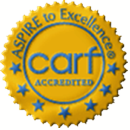Continuum of Care, Inc.’s mission is to enable people who are challenged with mental illness, intellectual disabilities, addiction, or homelessness to rebuild a meaningful life and thrive in the community.
Extended Living Programs & Housing First
SUPPORTED LIVING SERVICES
Extended Living Programs
The Extended Living Programs (ELP) offer a variety of supports to assist individuals with severe mental illness in managing their symptoms more effectively and overcoming challenges resulting from their illness. Each care plan is individualized based on resident’s strengths, needs, abilities and preferences. ELPs offer daily living skills development, social and recreational activities, transportation coordination, psychoeducational groups, crisis intervention, and access to community supports.
Based on level of need, some residents live in shared apartment settings and others live in independent apartments. The goal is to help individuals develop and maintain the necessary skills (problem solving and money management, for example) to sustain a more self-sufficient lifestyle and become productive members of society through managing mental health needs and substance abuse issues.
Key Components:
- Individual person-centered planning
- 24-hour emergency on-call coverage
- Group & individual programming
- Case management & life skills services
- Treatment collaboration with area providers
- 12-hour staffing, 8:00 a.m.-8:00 p.m., 7 days a week
Housing First
Housing First is a collaboration between the Connecticut Mental Health Center (CMHC) and Continuum of Care. The program serves adults in need of mental health or dual diagnosis treatment who are at risk of homelessness. Clinical services are provided by CMHC’s Assertive Community Treatment (ACT) team or residential team. Individuals are placed into permanent and independent housing with intensive residential supports available through Continuum’s Support Specialists. Once people are housed, the program utilizes a harm reduction approach to address substance use and illness management without requiring participation in psychiatric treatment.
Key Components:
- Rental assistance certificates
- Representative payee services
- Group & individual programming
- Permanent & independent housing
- Individual person-centered planning
- Treatment collaboration with area providers
- Break the cycle of homelessness by providing supported services
